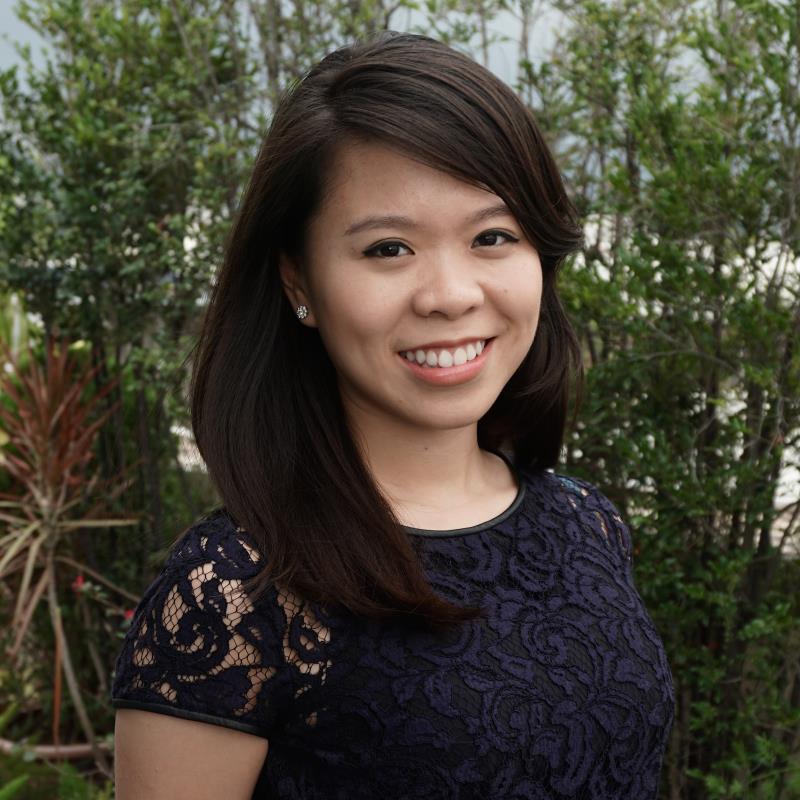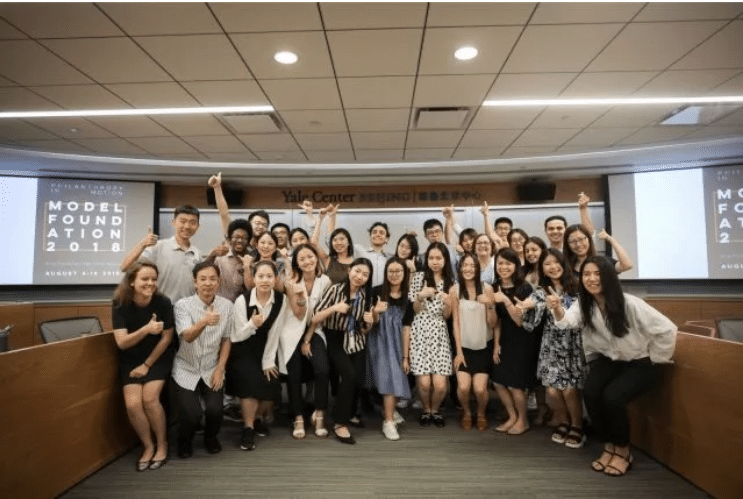
Editor’s Note
Jasmine Lau is the co-founder and executive director of Philanthropy in Motion (PIM), a social enterprise based in Beijing that provides education, training and funding for young people who want to get involved in philanthropy. Originally from Hong Kong, Jasmine received a BA from Yale and a Masters from Peking University. Apart from PIM, she has also founded Ember, a scholarship program for girls from rural China.
This interview was carried out in Beijing on July 23, 2018, by CDB’s Gabriel Corsetti.
Could you please tell us a bit about how you created Philanthropy in Motion?
Jasmine Lau: We created Philanthropy in Motion in 2013. The motivation was that we saw a lot of young people that are interested in social issues in China, but often times don’t feel they have a channel or a way to engage effectively. I was working at a foundation at that time, the Narada Foundation, and so that’s how I got exposed to many social entrepreneurs and organizations that are run by the grassroots, that are very independent and have a lot of interesting models, and I wanted to find a way to engage them.
We started a platform to do two things: education and funding. The first part is educating young people about social impact and effective philanthropy. For example, we created a program that is based off of a course that I took at Yale, which allows young people to form a foundation and go to investigate different issues, and then decide how to use that money most effectively. Through this learning-by-doing approach, these young people are able to get a much broader understanding of the philanthropic sector and how to measure impact, and think very strategically about how they want to create change.
So that’s our education model. As for the other part, we created PIM because we wanted to, in some way, democratize philanthropy and engage young people to support social organizations. This was before crowd-funding, and before a lot of the more public initiatives to promote philanthropy, so we organized crowd-funding around philanthropic initiatives, and had young people fund these grassroots organizations. We still do that a lot, based on channeling funding to support organizations that are selected by young people, vetted by young people, and often times founded or having a lot of support from young people.
Could you mention any specific programs or young people that you’ve supported? Are there any especially successful examples?
Jasmine: Sure. I think there are a lot that you might have featured in CDB. We generally like to support and fund organizations that are started by young people, and then stay with them and build their capacity. One of the organizations we’ve funded and worked with is MyH2O, which is a platform. They basically do water quality measurement. They send young people to measure water quality and then charge corporations to buy their data, using this way to promote awareness about pollution but also find a sustainable source of revenue.
We have also funded Education in Sight and Mantra, two organizations that are working to correct poor vision in rural areas in China. We also have programs that support the social entrepreneurs themselves, and through that we even had a student who started a tourism project in Kibera, which is in Kenya. They were really passionate about channeling Chinese tourism to bring revenue to Kibera, a slum area in Nairobi, so the project is about connecting tourism with generating local revenue, as well as selling handicraft and having DIY handicraft experiences. So it’s a Chinese angle, but outside of China. But we’ve been supporting a range of projects, and we’ve worked with 36 different social enterprises and non-profits in China.
PIM’s educational model is based on “learning by doing” and “learning by giving”, so could you tell us a bit more about what that means?
Jasmine: Well, I think there are an increasing number of programs where we see people teaching about social entrepreneurship or teaching the theory of social impact. But what PIM really advocates is giving people the responsibility to do something, and by giving that responsibility, people feel motivated to learn for a purpose. I can give an example from our summer program, “Model Foundation”. We have our participants go and research an issue and look at different organizations, and we give them around 20,000 US dollars that they can decide how to use. And so everything that they are learning and researching leads to some kind of real impact, and so they feel much more motivated, much more committed, and also much more empowered, because they have that decision-making power.
Another example is working on capacity building projects for non-profits, like creating impact evaluations and systems mapping. So in everything we do, we add a real world element. But we actually go and make sure that every time we work on a program we are channeling young people to work with social entrepreneurs and organizations on the ground, so they can develop a real understanding of the messy challenges involved in solving complex social problems, but hopefully also then make a real impact.
What causes would you say are the most popular among young people in China right now, and how would you say that the younger generation’s attitudes towards philanthropy, social involvement and social work has changed since you first got involved with this field in China?
Jasmine: I think surveys have shown that around one third of young people in China are very interested in social issues, and that’s consistent with millennials around the world, who have grown up in a slightly more comfortable environment than their parents. As for the main causes that young people care about, it’s quite diverse. One is education, because they have a personal relationship to education, but we have a lot of people who are interested in LGBT groups, and others who are passionate about the environment. I would also say that the whole movement of “social enterprises” as a concept is something that young people have latched onto, so really it’s not just supporting charities but also businesses or organizations that generate earned revenue to sustain their work.
Since you mention social enterprises, is PIM officially a social enterprise or an NGO/charity?
Jasmine: We are a social enterprise registered as a company, and we have a social mission of educating and promoting a culture of social impact in China. The way we get our revenue is through charging fees for our services. We run courses at universities and we run training programs for companies and foundations, so that’s how we sustain ourselves.
Would you say that in China there is a good recognition of the concept of social enterprise, or 社会企业?
Jasmine: No. I think that when the vast majority of people think about social issues, they think about volunteering or maybe charities, and they think that staff should work for free or charities should not charge anything for their services. I would say that is still the preconception that most people have. However, we have done a lot of educational programs and outreach with younger people to promote the concepts of social entrepreneurship and social enterprise. I think a lot of people do agree and identify with this value. In the past few years, in our programs, we find that a lot of the students will choose to support social enterprises instead of pure charities. They might give funding to them because they think there’s a higher potential for them to grow in the Chinese environment, and there is also a number of students who have gone through our programs and started their own social enterprises.
PIM also has a program matching the crowdfunding initiatives of millennials with financial sponsorship. In China recently there have been quite a few scandals related to popular crowdfunding programs, when there were allegations that the information was misleading or the funds were being misused. Do you find that’s a problem, also in terms of trust from the public?
Jasmine: I think the reason we do crowdfunding is also, again, empowerment: we believe that young people have a role to play, and they can use their networking resources. Even if their friends are just, say, donating 10 kuai, it’s taking that initiative and then also the collective impact that matters. So in terms of crowdfunding what we do is that we always vet the organization, students are crowd-funding for vetted organizational partners that have gone through a screening, and obviously we check on the information and PIM provides the follow-up support in terms of delivering that funding to the organization. But I think crowdfunding has been amazing in China, for instance if you look at the 9/9 charity day and how it’s really grown exponentially. I think with that there’s always going to be cases of corruption or non-transparency, but we shouldn’t let that deter the broader vision of it, which is to allow more organizations to be able to reach the public, to raise awareness for their issues, and get people’s support.

How do you see the effects of China’s two recent laws on civil society, the Charity Law and the Overseas NGO Law?
Jasmine: I think it is a good thing that China set up these laws, I think it’s a big achievement that they have been able to put them together, and it’s definitely clarified a lot of the previous concerns over working in a grey area. I think the implementation of the laws sometimes could be challenging given that there are so many organisations, and also it depends on which agencies are doing the supervision. We’re not a foreign NGO, we’re a company, so we don’t have issues with the Overseas NGO Law, but it’s something that we’ve seen other, smaller partner organisations get stuck on. They’re doing really good work, but they are not able to find a good supervisory agency, and hence they have to either leave China or join forces with other bigger organisations. So I think it’s a natural part of evolution, but like any policy in China it takes time to implement and figure out.
I also know quite a lot of local organisations that have decided they cannot or would not any longer want to go through the bother of getting outside funding. But for a lot of organisations it has shifted their focus to internal Chinese fundraising, and in some ways that’s a good sign too.
What are your plans for the future?
Jasmine: So there are few things. We have a summit coming up that we’re hoping will become a focal point for young people who are interested in social innovation and social impact, and it will be held at the Yale Centre in Beijing on August 11th. We’re bringing in Jet Lee and a lot of amazing speakers, and we are really trying to highlight philanthropy and social innovation featuring young people. Our long-term goal is to promote a culture where success is not defined just by financial factors, so how much money you make, but it’s more about the social impact, and that becomes a well-accepted part of society.
It’s a huge challenge I would say, there are a lot of burdens and traditional mindsets and we are trying to break through them, so that’s one element we’re trying to push for through the summit and other initiatives. The other side is that we’re trying to develop degree programs on social innovation. Right now there isn’t a full four-year program that’s focused on these topics, and we’re working with some universities to try and create a degree program so that it can make social innovation mainstream. These are a few of the things we’re looking forward to.
That all sounds very exciting. Before co-founding PIM, earlier on you started another foundation to help girls in rural China go to high school. Could you tell us a bit more about that?
Jasmine: Yeah, it’s called Ember and it’s still running, it’s been running for 11 years now, it supports girls from rural Guangdong to go to high school and university. We also provide them with leadership training and other sorts of training. There is one story that shows how Ember links to my current work at PIM and how it really influenced me: there is a girl called Ocean, and when we first started the initiative at Ember we were both 16 and both in high school. I was the one on the side that fundraised for the scholarship and she was the one on the side that received that scholarship, but we really built a bond, and I was thinking that it was really the luck of the draw that I was born in Hong Kong and had access to education and she didn’t.
But one thing that she said after receiving the scholarship that really inspired me was “I’m so jealous of you because you have the privilege to give and to contribute, whereas I’m on the side of the beneficiary, the taker”, and that’s something I think has really fundamentally affected me, because I think it is a privilege to give, but it shouldn’t just be the privilege of someone who has the resources. Anyone can participate in social innovation and social change, and so our leadership and empowerment program for these girls, these scholarship recipients has now shifted to focusing on community service and volunteering, to really help them get a sense that they can also create change.
Ocean herself started a volunteering organisation that evolved into an NGO, and now it’s our main local Chinese partner when we are administrating these scholarships. So I think the whole idea that anyone, regardless of their age, level of resources or family background can have the potential to become a change-maker is something I’ve taken on with what I do at PIM as well.
That’s an amazing story. So you started your first organisation at 16? That was quite precocious.
Jasmine: Thank you. I think when you’re young you don’t really know what is possible and what isn’t, and in some ways it’s actually easier to do something, because you don’t have the baggage, you’re not thinking “will I make my salary?”, you just do it. I though it was a good cause, and I felt really connected with those girls who were literally just five hours away from Hong Kong but lived in a completely different world.
Do you have any particular anecdotes or stories from your work that you would like to share with us?
Jasmine: Yes I have one, it’s about the student who started the project in Kibera I mentioned earlier. So we ran a social entrepreneurship class in Beijing Foreign Studies University. We went around and each student shared about their passion for a social issue and why they joined the class. When we came to this student, Andrey, he said that he was really passionate about this particular slum in Nairobi, Kibera. And at first no one wants to be on the Kibera group because they’re like “why should we care about somewhere in Africa?”
But then Andrey said “please give me a chance, this is my life’s work.” So the professor gave him an extra three minutes to give a pitch. And he shared what he saw there and why he cared, and how it’s important to have a global mind-set. He then ended up being able to recruit another student and they started working on developing these projects. The way this course worked was that we used an online course from Wharton, and then offline people would work on their projects and develop their business model. Halfway through the class, he flew to Kibera to set up the company, he started negotiating –
And how old was he?
Jasmine: I don’t know, maybe 23? He was a Master’s student. He flew there, he started the company, he would send us photos of him negotiating with Chinese tour companies, and in the competition he actually won first place. The judges picked his project as one of the ones that were most feasible, well thought out and definitely had showed a lot of commitment to succeed.
This story always reminds me of two things: one is never underestimate the passion of a young person who really cares and will go out of their way to do something. This class was just a spark, we gave him some resources, he won some funding, we gave him a framework and he went off and did it. And I think the other thing is that PIM tries to promote global citizenship, and ultimately it’s something very precious to see a young Chinese person also caring so much about the rest of the world. I think that sometimes people don’t think about that, they look at the more nationalistic side of China, but personally I see a lot of Chinese people, young Chinese, embodying that aspect of global citizenship as well.



